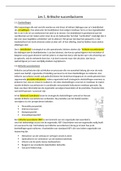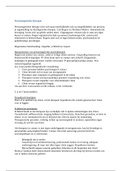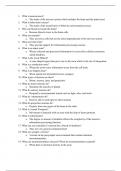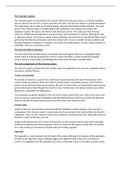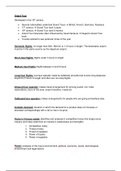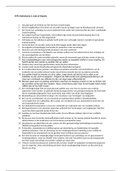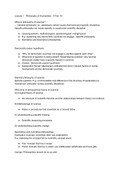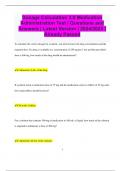IBCOM Year 1
IC Notes
Chapter 1
Approaching intercultural communication
Three studies used to explain intercultural communication:
1. An investigation of the ways in which British and Italian service staff of an airline
respond to service failure.
a. Similarities were due to the same airline training, while the difference in
workers attitudes was due to cultural differences.
b. Cross-cultural communication - Culture understood as identical to
nation
i. Start with an assumption of distinct cultural groups and
investigate aspects of their communicative practices
comparatively.
2. An investigation of how Korean immigrant shopkeepers in Los Angeles interact with
African-American customers.
a. The difference in communicative styles within cultures.
b. Intercultural communication - Culture understood as ethnicity/race
i. Start with an assumption of distinct cultural groups and
investigate their communicative practices in interaction
with each other.
3. An investigation of the ways in which people who live in tourist destinations are being
represented in travel writing.
a. People living in tourist destinations are not seen as part of a complex
society.
b. Inter-discourse communication - Culture seen as product of the text
instead of social variable
i. Avoids priori notions of cultural identity, investigates how
culture is made relevant in text and talk.
These three studies are concerned with service work, convenience shopping and reading the
newspaper.
Culture should not be considered as something that people have but something that is created and
recreated through text and talk.
Three examples to find the underlying understanding of culture:
1. The culture entries of three national .com sites. (National .com sites are marketing
tools, typically geared towards tourism but also aiming at overseas business investors)
a. Culture is part of a country's assets
2. Culture in business travel advisories. (In addition to practical advice and assistance,
such sites often also provide some cultural advice)
a. Culture is one of the challenges and difficulties that international
companies need to manage.
, 3. News reports about an international gay and lesbian conference, which was banned in
Ghana.
a. Culture is invoked in relation to citizenship
Each example takes the nation as the basic unit of culture.
The status of culture in all three examples is that of an entity and the existence of that
entity is presupposed.
Culture is often invoked against the equal rights of immigrants, indigenous minorities, religious
minorities or women.
Culture as a national asset is linked to 'High culture': History, the arts and festivals.
At the same time there is also 'Popular culture': Folklore, belief systems and
particularly cuisine.
Culture as a challenge - Mostly about interpersonal relationships and how these are communicated
verbally and non-verbally.
Culture as citizenship - Consists of practices that are widely seen as signifying a particular identity.
Status of culture:
The entity understanding of culture is essentialist: It treats culture as something people have or to
which they belong to.
The process view of culture is constructionist: It treats culture as something people do, which they
perform, and, crucially, compete over.
Chapter 2
Discourses of culture, cultural difference, and intercultural communication arose in the historical
context of the nineteenth and twentieth centuries as part of the processes of colonialism.
The view of different people having different cultures, and these cultures being hierarchically
ordered, with European culture being the most superior started in the nineteenth century.
Colonialism - The practice of acquiring full or partial political control over another country, occupying
and exploiting it economically.
Increased travel led to an increased awareness of different people and where the subjugation and
exploitation of those people needed to be morally justified.
Their assumed cultural inferiority together with the assumption of a developmental
path from slavery to civilization provided the moral justification for colonialism.
The meaning of culture that emerged in the nineteenth century was not only part of
the justification of colonialism, it made colonialism as a civilizing effort a moral
obligation, the White man's burden.
Orientalism - Form of exerting dominance over others by making statements about them, settling
their lands, authorizing views of them, describing them, teaching them and ruling over them.
Multiculturalism - Cultural difference is seen as a form of diversity that is enriching and that is cause
for celebration.
IC Notes
Chapter 1
Approaching intercultural communication
Three studies used to explain intercultural communication:
1. An investigation of the ways in which British and Italian service staff of an airline
respond to service failure.
a. Similarities were due to the same airline training, while the difference in
workers attitudes was due to cultural differences.
b. Cross-cultural communication - Culture understood as identical to
nation
i. Start with an assumption of distinct cultural groups and
investigate aspects of their communicative practices
comparatively.
2. An investigation of how Korean immigrant shopkeepers in Los Angeles interact with
African-American customers.
a. The difference in communicative styles within cultures.
b. Intercultural communication - Culture understood as ethnicity/race
i. Start with an assumption of distinct cultural groups and
investigate their communicative practices in interaction
with each other.
3. An investigation of the ways in which people who live in tourist destinations are being
represented in travel writing.
a. People living in tourist destinations are not seen as part of a complex
society.
b. Inter-discourse communication - Culture seen as product of the text
instead of social variable
i. Avoids priori notions of cultural identity, investigates how
culture is made relevant in text and talk.
These three studies are concerned with service work, convenience shopping and reading the
newspaper.
Culture should not be considered as something that people have but something that is created and
recreated through text and talk.
Three examples to find the underlying understanding of culture:
1. The culture entries of three national .com sites. (National .com sites are marketing
tools, typically geared towards tourism but also aiming at overseas business investors)
a. Culture is part of a country's assets
2. Culture in business travel advisories. (In addition to practical advice and assistance,
such sites often also provide some cultural advice)
a. Culture is one of the challenges and difficulties that international
companies need to manage.
, 3. News reports about an international gay and lesbian conference, which was banned in
Ghana.
a. Culture is invoked in relation to citizenship
Each example takes the nation as the basic unit of culture.
The status of culture in all three examples is that of an entity and the existence of that
entity is presupposed.
Culture is often invoked against the equal rights of immigrants, indigenous minorities, religious
minorities or women.
Culture as a national asset is linked to 'High culture': History, the arts and festivals.
At the same time there is also 'Popular culture': Folklore, belief systems and
particularly cuisine.
Culture as a challenge - Mostly about interpersonal relationships and how these are communicated
verbally and non-verbally.
Culture as citizenship - Consists of practices that are widely seen as signifying a particular identity.
Status of culture:
The entity understanding of culture is essentialist: It treats culture as something people have or to
which they belong to.
The process view of culture is constructionist: It treats culture as something people do, which they
perform, and, crucially, compete over.
Chapter 2
Discourses of culture, cultural difference, and intercultural communication arose in the historical
context of the nineteenth and twentieth centuries as part of the processes of colonialism.
The view of different people having different cultures, and these cultures being hierarchically
ordered, with European culture being the most superior started in the nineteenth century.
Colonialism - The practice of acquiring full or partial political control over another country, occupying
and exploiting it economically.
Increased travel led to an increased awareness of different people and where the subjugation and
exploitation of those people needed to be morally justified.
Their assumed cultural inferiority together with the assumption of a developmental
path from slavery to civilization provided the moral justification for colonialism.
The meaning of culture that emerged in the nineteenth century was not only part of
the justification of colonialism, it made colonialism as a civilizing effort a moral
obligation, the White man's burden.
Orientalism - Form of exerting dominance over others by making statements about them, settling
their lands, authorizing views of them, describing them, teaching them and ruling over them.
Multiculturalism - Cultural difference is seen as a form of diversity that is enriching and that is cause
for celebration.


